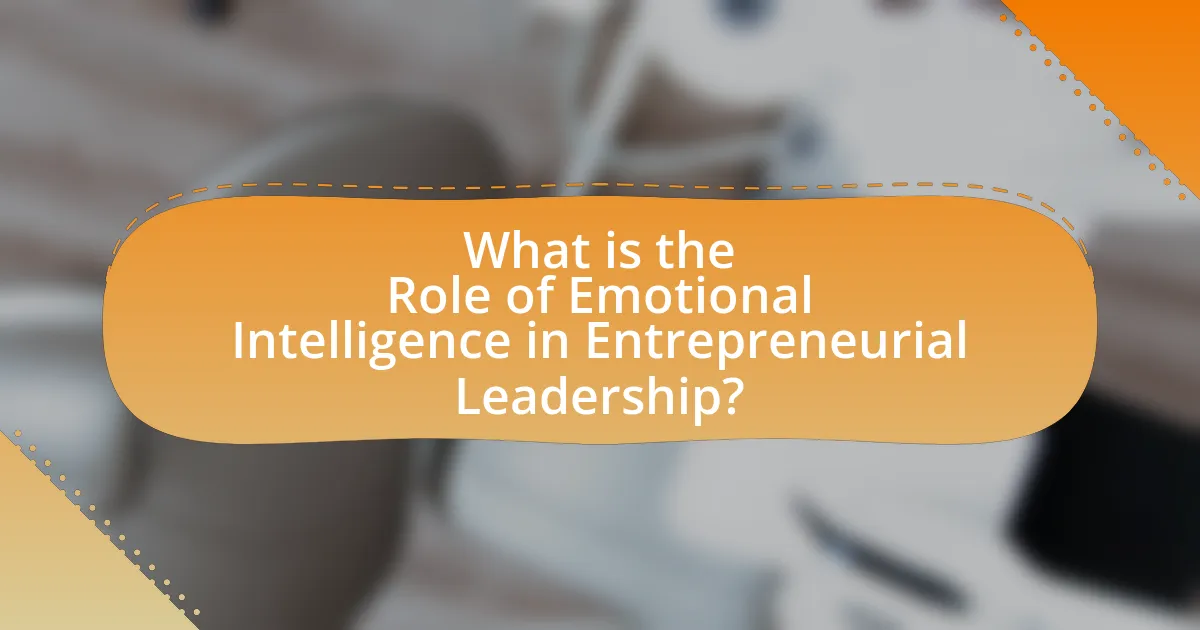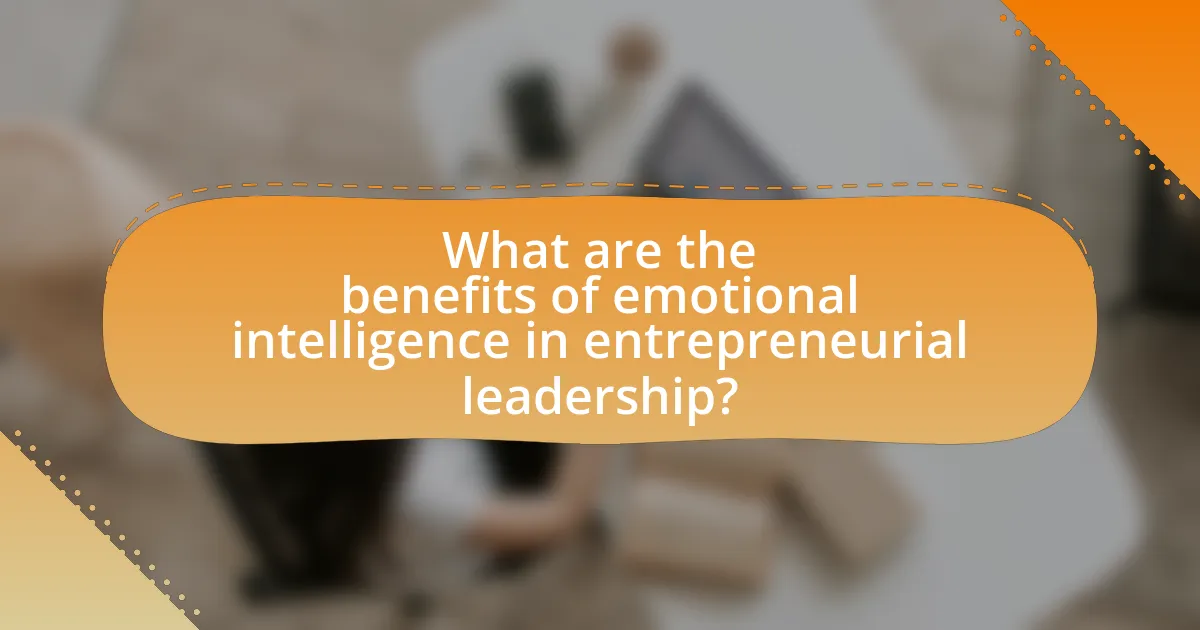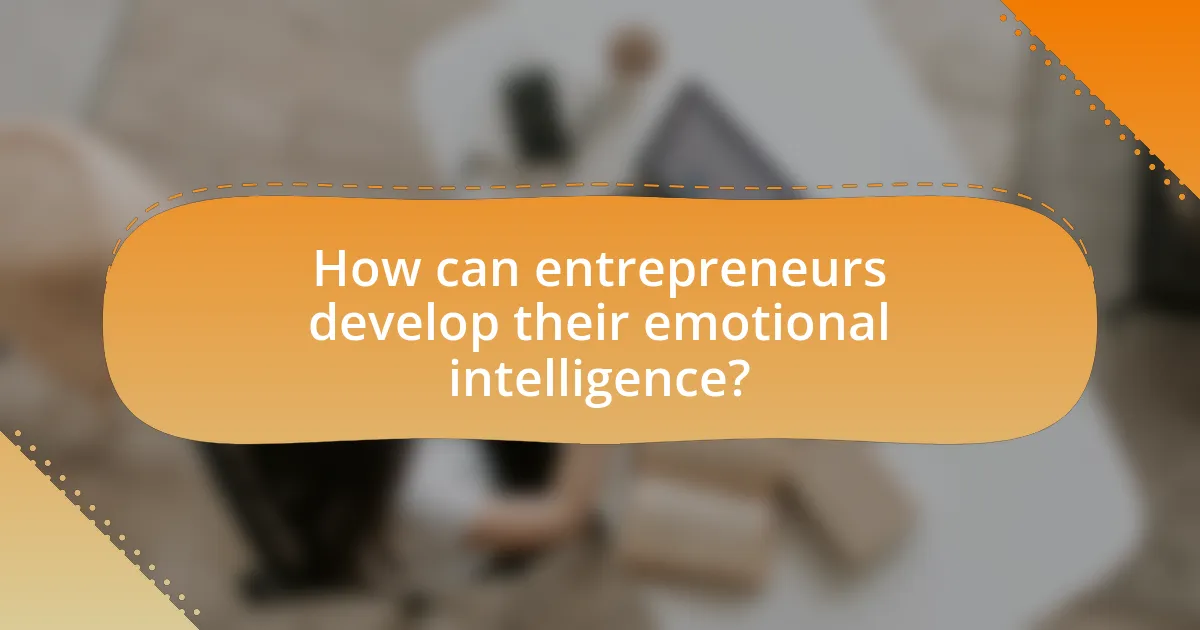Emotional intelligence is a critical component of entrepreneurial leadership, enabling leaders to understand and manage their own emotions while effectively navigating the emotions of others. This article explores the significant influence of emotional intelligence on leadership effectiveness, decision-making, team dynamics, and conflict resolution. Key components such as self-awareness, self-regulation, social awareness, and relationship management are examined, along with their interaction with entrepreneurial skills. The article also highlights the benefits of emotional intelligence in fostering a positive organizational culture, enhancing customer relationships, and ultimately driving business success. Additionally, it addresses the challenges entrepreneurs face without emotional intelligence and offers strategies for its development.

What is the Role of Emotional Intelligence in Entrepreneurial Leadership?
Emotional intelligence plays a crucial role in entrepreneurial leadership by enabling leaders to understand and manage their own emotions while effectively navigating the emotions of others. This skill set enhances decision-making, fosters strong team dynamics, and improves conflict resolution. Research indicates that leaders with high emotional intelligence can create a positive organizational culture, which is essential for innovation and employee engagement. For instance, a study published in the Journal of Business and Psychology found that emotional intelligence significantly correlates with leadership effectiveness, highlighting its importance in driving business success.
How does emotional intelligence influence leadership effectiveness?
Emotional intelligence significantly enhances leadership effectiveness by enabling leaders to understand and manage their own emotions while also empathizing with the emotions of others. This capability fosters better communication, conflict resolution, and team cohesion, which are essential for effective leadership. Research indicates that leaders with high emotional intelligence are more likely to create positive work environments, leading to increased employee satisfaction and productivity. For instance, a study published in the Journal of Organizational Behavior found that emotionally intelligent leaders positively impact team performance and employee engagement, demonstrating the direct correlation between emotional intelligence and effective leadership outcomes.
What are the key components of emotional intelligence in leadership?
The key components of emotional intelligence in leadership are self-awareness, self-regulation, social awareness, and relationship management. Self-awareness allows leaders to understand their emotions and how they affect their performance and interactions. Self-regulation enables leaders to manage their emotions and impulses, fostering a calm and thoughtful approach to decision-making. Social awareness involves recognizing and understanding the emotions of others, which is crucial for empathy and effective communication. Relationship management encompasses the ability to inspire, influence, and develop others while managing conflict and fostering teamwork. Research by Daniel Goleman highlights that leaders with high emotional intelligence can drive better organizational performance and employee satisfaction.
How do these components interact with entrepreneurial skills?
Emotional intelligence components, such as self-awareness, self-regulation, motivation, empathy, and social skills, significantly enhance entrepreneurial skills by enabling leaders to navigate complex interpersonal dynamics and make informed decisions. For instance, self-awareness allows entrepreneurs to recognize their strengths and weaknesses, which aids in effective team management and strategic planning. Empathy fosters better customer relationships and team cohesion, leading to improved collaboration and innovation. Research by Goleman (1998) in “Working with Emotional Intelligence” indicates that emotional intelligence is a key predictor of success in leadership roles, further validating the interaction between these components and entrepreneurial skills.
Why is emotional intelligence critical for entrepreneurs?
Emotional intelligence is critical for entrepreneurs because it enhances their ability to understand and manage their own emotions, as well as the emotions of others, which is essential for effective leadership and decision-making. Entrepreneurs with high emotional intelligence can build strong relationships, foster teamwork, and navigate the complexities of interpersonal dynamics in business environments. Research indicates that emotionally intelligent leaders are more successful in motivating their teams and achieving organizational goals, as they can empathize with employees and respond to their needs effectively. For instance, a study published in the Journal of Business and Psychology found that emotional intelligence significantly correlates with leadership effectiveness, highlighting its importance in entrepreneurial success.
What impact does emotional intelligence have on decision-making?
Emotional intelligence significantly enhances decision-making by enabling individuals to recognize, understand, and manage their own emotions and the emotions of others. This heightened awareness allows for more informed and empathetic choices, leading to better interpersonal relationships and team dynamics. Research indicates that leaders with high emotional intelligence are more adept at navigating complex social situations, which directly influences their ability to make sound decisions under pressure. For instance, a study published in the Journal of Organizational Behavior found that leaders with strong emotional intelligence skills are more likely to foster a positive work environment, resulting in improved team performance and decision outcomes.
How does emotional intelligence affect team dynamics and collaboration?
Emotional intelligence significantly enhances team dynamics and collaboration by fostering better communication and understanding among team members. Teams with high emotional intelligence exhibit improved conflict resolution, as members can empathize with each other’s perspectives, leading to more constructive discussions. Research by Dr. Daniel Goleman indicates that emotionally intelligent teams are 20% more productive, as they can navigate interpersonal relationships effectively, reducing misunderstandings and promoting a supportive work environment. This ability to connect emotionally not only strengthens relationships but also drives collective problem-solving and innovation, ultimately leading to higher team performance.

What are the benefits of emotional intelligence in entrepreneurial leadership?
Emotional intelligence in entrepreneurial leadership enhances decision-making, team dynamics, and overall business performance. Leaders with high emotional intelligence can better understand and manage their own emotions, as well as empathize with others, leading to improved communication and collaboration within teams. Research indicates that emotionally intelligent leaders foster a positive work environment, which can increase employee engagement and retention. For instance, a study published in the Journal of Business and Psychology found that emotional intelligence is significantly correlated with leadership effectiveness, demonstrating that leaders who exhibit emotional awareness can drive better organizational outcomes.
How does emotional intelligence contribute to business success?
Emotional intelligence significantly contributes to business success by enhancing leadership effectiveness, improving team collaboration, and fostering a positive workplace culture. Leaders with high emotional intelligence can better understand and manage their own emotions, as well as empathize with their employees, leading to improved communication and conflict resolution. Research indicates that organizations with emotionally intelligent leaders experience higher employee engagement and retention rates, which directly correlates with increased productivity and profitability. For instance, a study by TalentSmart found that emotional intelligence accounts for 58% of job performance across various industries, highlighting its critical role in achieving business objectives.
What role does emotional intelligence play in conflict resolution?
Emotional intelligence plays a crucial role in conflict resolution by enabling individuals to understand and manage their own emotions while also empathizing with others. This understanding fosters effective communication, allowing parties to express their concerns and feelings constructively. Research indicates that leaders with high emotional intelligence are better equipped to navigate conflicts, as they can recognize emotional triggers and respond appropriately, reducing tension and facilitating collaboration. For instance, a study published in the Journal of Organizational Behavior found that teams led by emotionally intelligent leaders experienced fewer conflicts and resolved issues more efficiently, demonstrating the positive impact of emotional intelligence on conflict resolution outcomes.
How can emotional intelligence enhance customer relationships?
Emotional intelligence enhances customer relationships by enabling leaders to understand and manage their own emotions while empathizing with customers’ feelings. This understanding fosters trust and loyalty, as customers feel valued and understood. Research indicates that companies with high emotional intelligence in their customer service teams experience a 20% increase in customer satisfaction and retention rates. By effectively addressing customer concerns and adapting communication styles, emotionally intelligent leaders can create a more positive and engaging customer experience, ultimately driving business success.
What challenges do entrepreneurs face without emotional intelligence?
Entrepreneurs without emotional intelligence face significant challenges in leadership, decision-making, and relationship management. The lack of emotional intelligence can lead to poor communication, resulting in misunderstandings and conflicts within teams. Additionally, these entrepreneurs may struggle to empathize with customers and employees, which can hinder customer satisfaction and employee retention. Research indicates that emotional intelligence is linked to effective leadership; for instance, a study published in the Journal of Business and Psychology found that leaders with high emotional intelligence are more successful in motivating their teams and achieving organizational goals. Without this critical skill, entrepreneurs may experience higher turnover rates and lower overall business performance.
How can a lack of emotional intelligence hinder leadership effectiveness?
A lack of emotional intelligence can significantly hinder leadership effectiveness by impairing a leader’s ability to understand and manage their own emotions and those of their team members. This deficiency can lead to poor communication, decreased team morale, and ineffective conflict resolution. For instance, research published in the Journal of Organizational Behavior indicates that leaders with low emotional intelligence struggle to build trust and rapport with their teams, which are critical components of effective leadership. Consequently, this can result in lower employee engagement and productivity, ultimately affecting organizational performance.
What are the consequences of poor emotional intelligence in business?
Poor emotional intelligence in business leads to decreased employee morale and productivity. When leaders lack emotional awareness, they struggle to connect with their teams, resulting in poor communication and misunderstandings. Research indicates that organizations with low emotional intelligence experience higher turnover rates, as employees feel undervalued and disengaged. Additionally, poor emotional intelligence can lead to ineffective conflict resolution, fostering a toxic work environment that stifles collaboration and innovation. A study by the Harvard Business Review found that leaders with high emotional intelligence are 60% more effective in their roles, highlighting the stark contrast in outcomes for those lacking this critical skill.

How can entrepreneurs develop their emotional intelligence?
Entrepreneurs can develop their emotional intelligence by engaging in self-reflection, seeking feedback, and practicing empathy. Self-reflection allows entrepreneurs to understand their emotions and reactions, which is essential for emotional awareness. Seeking feedback from peers and mentors provides insights into how their emotional responses affect others, fostering social awareness. Practicing empathy involves actively listening to others and understanding their perspectives, which enhances interpersonal skills. Research indicates that emotional intelligence can be improved through targeted training and practice, demonstrating that these methods are effective for entrepreneurs aiming to enhance their leadership capabilities.
What strategies can enhance emotional intelligence in leadership?
Strategies that can enhance emotional intelligence in leadership include self-awareness training, active listening practices, and empathy development exercises. Self-awareness training helps leaders recognize their own emotions and how these affect their behavior, which is crucial for effective leadership. Active listening practices encourage leaders to fully engage with their team members, fostering open communication and trust. Empathy development exercises, such as role-playing or perspective-taking activities, enable leaders to understand and relate to the emotions of others, enhancing their ability to connect with their team. Research indicates that leaders with high emotional intelligence are more effective in managing teams and driving performance, as they can navigate interpersonal dynamics more skillfully.
How can self-awareness be improved among entrepreneurs?
Self-awareness among entrepreneurs can be improved through reflective practices, feedback mechanisms, and emotional intelligence training. Engaging in regular self-reflection allows entrepreneurs to assess their thoughts, feelings, and behaviors, leading to greater insight into their motivations and decision-making processes. Additionally, seeking feedback from peers, mentors, and employees provides external perspectives that can highlight blind spots and areas for growth. Research indicates that emotional intelligence training enhances self-awareness by teaching individuals to recognize and understand their emotions, which is crucial for effective leadership. For instance, a study published in the Journal of Business and Psychology found that emotional intelligence is positively correlated with self-awareness, suggesting that targeted training can significantly enhance this trait among entrepreneurs.
What role does feedback play in developing emotional intelligence?
Feedback is crucial in developing emotional intelligence as it provides individuals with insights into their emotional responses and behaviors. This process allows individuals to recognize their strengths and weaknesses in emotional regulation and interpersonal interactions. Research indicates that receiving constructive feedback enhances self-awareness, a key component of emotional intelligence, by helping individuals understand how their emotions affect their decision-making and relationships. For example, a study published in the Journal of Applied Psychology found that feedback significantly improved emotional awareness and regulation among participants, demonstrating its effectiveness in fostering emotional intelligence development.
What resources are available for improving emotional intelligence?
Resources available for improving emotional intelligence include books, online courses, workshops, and assessments. Notable books such as “Emotional Intelligence 2.0” by Travis Bradberry and Jean Greaves provide practical strategies for enhancing emotional skills. Online platforms like Coursera and Udemy offer courses specifically focused on emotional intelligence development, often featuring expert instructors. Workshops conducted by organizations like the Emotional Intelligence Training Company provide hands-on experiences and group activities to foster emotional awareness. Additionally, assessments such as the EQ-i 2.0 measure emotional intelligence levels and identify areas for improvement, enabling targeted development. These resources collectively support individuals in enhancing their emotional intelligence, which is crucial for effective entrepreneurial leadership.
Which training programs focus on emotional intelligence for leaders?
Training programs that focus on emotional intelligence for leaders include the Emotional Intelligence Leadership Program by the Institute for Health and Human Potential, the Emotional Intelligence Training for Leaders by TalentSmart, and the Leadership and Emotional Intelligence program offered by the Center for Creative Leadership. These programs are designed to enhance leaders’ self-awareness, empathy, and interpersonal skills, which are critical for effective leadership. Research indicates that leaders with high emotional intelligence can improve team performance and employee satisfaction, as evidenced by a study published in the Journal of Organizational Behavior, which found a positive correlation between emotional intelligence and leadership effectiveness.
How can mentorship contribute to emotional intelligence development?
Mentorship significantly contributes to emotional intelligence development by providing guidance and feedback that enhance self-awareness and interpersonal skills. Through regular interactions, mentors model emotional regulation and empathy, allowing mentees to observe and practice these essential skills in real-world scenarios. Research indicates that mentorship fosters a supportive environment where individuals can explore their emotions and learn to navigate social complexities, which are critical components of emotional intelligence. For instance, a study published in the Journal of Business and Psychology found that mentorship positively impacts emotional intelligence by promoting reflective practices and emotional understanding among mentees.
What are practical tips for applying emotional intelligence in leadership?
Practical tips for applying emotional intelligence in leadership include actively listening to team members, demonstrating empathy, and managing one’s own emotions effectively. Active listening involves fully concentrating on what is being said, which fosters trust and open communication. Demonstrating empathy allows leaders to understand and relate to the feelings of their team, enhancing collaboration and morale. Managing one’s own emotions is crucial for maintaining a positive work environment and setting a tone for emotional regulation within the team. Research indicates that leaders with high emotional intelligence can improve team performance and employee satisfaction, as evidenced by a study published in the Journal of Organizational Behavior, which found a strong correlation between emotional intelligence and leadership effectiveness.



